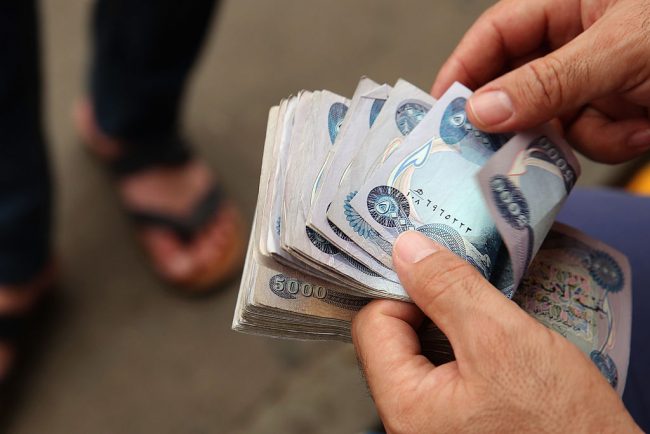The Islamic State group is hemorrhaging money with every piece of territory it loses, according to a new analysis that found that the group’s “business model” is on the path to failure.

The analysis released Saturday by the International Centre for the Study of Radicalisation and Political Violence and the accounting firm EY found that the self-proclaimed caliphate’s financial resources have been drained substantially since the days beginning in mid-2014 when it captured banks, oil wells and entire warehouses of weapons as it amassed land.
The report found that Islamic State revenue has declined from up to $1.9 billion in 2014 to at most $870 million in 2016.
READ MORE: ISIS turns to extortion, kidnapping for revenue as allies win back territory
“One of the mistakes that’s been made in the past when we were talking about Islamic State was talking about it purely as a terrorist organization. It is a terrorist organization but it is more than that. It holds territory,” said Peter Neumann, director of the centre at King’s College London. “That also means it has a lot more expenses. It needs to fix roads. It needs to pay teachers. It needs to run health services. It needs to pay for these things that al-Qaeda never had to.”
But less money may not make the group less dangerous, the report said.
“We know from the attacks in Paris and Brussels and Berlin that none of them was expensive,” Neumann said.

Get daily National news
Most of the recent attacks in Europe and the U.S. were self-financed by the people that carried them out, with little input or money from the IS leadership in the war zone of Syria and Iraq.
WATCH: Baghdad car bomb kills 51 as Islamic State escalates insurgency

Among the top sources of revenue for the Islamic State group were taxes and fees, oil, ransoms, and looting or other extortion. All of those, Neumann said, required newly captured territory to be sustainable and to keep the group’s promise of a caliphate.
A federal lawsuit filed in December was a prime example of Islamic State’s revenues from a combination of seized land, taxes and extortion. According to the court filing, the group received at least 20 per cent of the proceeds of items excavated from archaeological sites under its control and taxed antiquities sold in its territories. At one point, a child was kidnapped to force an antiquities merchant to pay, said the lawsuit, which sought the recovery of four ancient artifacts believed to have been put up for sale by the group.
But that income only flows when Islamic State can exert absolute control. According to an update Friday from the global coalition against Islamic State, the group has lost 62 per cent of the territory it controlled in Iraq at its height in August 2014 and 30 per cent of its territory in Syria.
- Mohamed Al-Fayed, whose son died with Princess Diana, accused of multiple rapes
- 12-year-old shoots, kills black bear attacking his dad in Wisconsin
- Yellowstone Park tourist burns leg after going off trail near Old Faithful
- Hezbollah chief says Israel crossed ‘red lines’ with exploding device attacks
READ MORE: UN diplomat says Islamic State seeking new revenue streams
“The business model was also to constantly expand and to plunder the areas that were becoming part of the caliphate. It was essentially a pyramid scheme which relied upon constant expansion,” Neumann said.
A U.S. defence official said IS still has enough money to pay its bills, despite the fact that it has lost sources of income and has reduced what it pays foot soldiers. The official said the U.S. certainly has not seen IS’ financial situation damaged to the point that it has degraded its ability to conduct external attacks. The official was not authorized to publicly discuss IS and spoke only on condition of anonymity.
Near-daily car bombings in Baghdad indicate that the group’s ability to inflict carnage is undiminished in Iraq, even as it cedes ground it once controlled.
But Neumann said the fall of the northern Iraqi city of Mosul could be a lethal blow in the long term.
“The brand of Islamic State will suffer and the attractiveness of wanting to carry out terrorist attacks in the name of Islamic State will suffer because it is no longer projecting strength and utopia,” Neumann said.







Comments